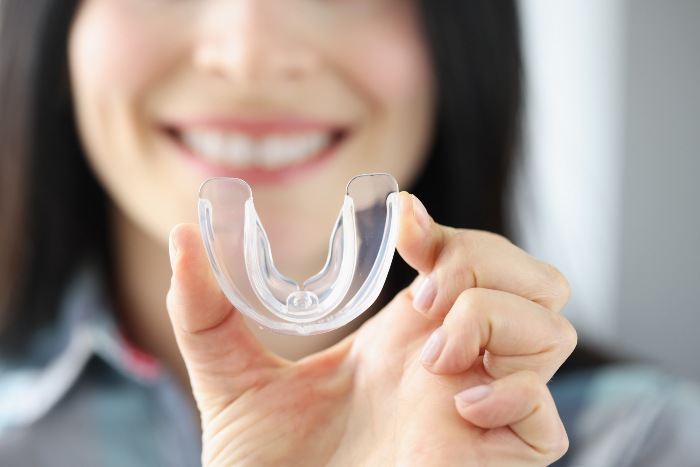Night Guards Signs You Need Them and How They Work
Night Guards-What are Signs You Need One?

Waking up in the morning with jaw pain and headache could mean several things. But it likely is a sign of teeth clenching or grinding during sleep. The solution to this problem may be a night guard. This can be very effective in protecting the teeth during resting hours.
Bruxism
The act of grinding or clenching the teeth is a common condition called bruxism. This can be present in adults or children. Some signs that you may have bruxism include the following:
- Waking up with a sore jaw or a headache
When you have pain in your jaw or head in the morning, this could be a sign that you are clenching your teeth when you sleep. - Sleep Disorders
Having a sleep disorder can be a real nightmare. One of the most common causes of sleep disorders is bruxism. The clenching and grinding of teeth can seriously disrupt a full night of sleep. - Chipped, Broken, or Cracked Teeth
If you begin to notice damaged teeth, you may have bruxism. This is very dangerous and can mean serious damage to the teeth. - Tooth Sensitivity
If your teeth are overly sensitive, this may mean that they are suffering from the damage of bruxism. As we clench or grind, the enamel from the tooth can be damaged and the nerve’s more exposed. This means that the teeth will likely be much more sensitive.
While bruxism doesn’t always occur at night, it is usually consistent with sleep hours. How do you protect against this type of damage when you are asleep? The answer is to use a night guard.
TMJ
Temporomandibular joint disorder is another reason someone might need a night guard. This is usually referred to as TMJ and it is also referred to as lockjaw. A simple translation is that it’s just a tightening of the jaw that can be remedied by using a night guard.
Night Guards: How do they Work?
Night guards act as a cushion between your top teeth and your bottom teeth. They can help protect against the dangers of bruxism and TMJ. Since your teeth can’t touch each other when you are wearing the night guard, it makes it impossible for them to grind together.
The fact that a night guard is cushioned means that when you do clench or grind, the effect of the grinding and clenching is minimized. Everything is cushioned and the pain and damage are prevented.
Furthermore, the cushioning of the night guard prevents damage to enamel and damage to the tooth. Say goodbye to cracked or damaged teeth. With a night guard, you no longer need to worry about this kind of damage.
When you are ready to be fitted for a night guard, call Beyond Dentistry Laser Center. We are experts in expediting dental procedures. From our world-renowned one-hour implant, to being fitted for the right night guard, we are extremely skilled at providing the best dental care to meet your needs. For more information, visit our website or just give us a call at (718) 436-0202.
